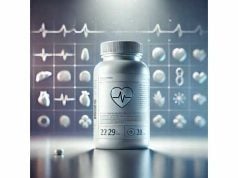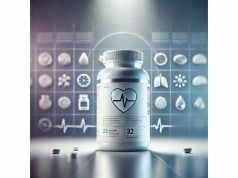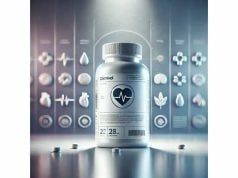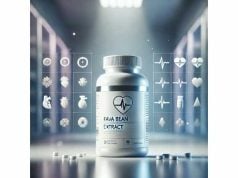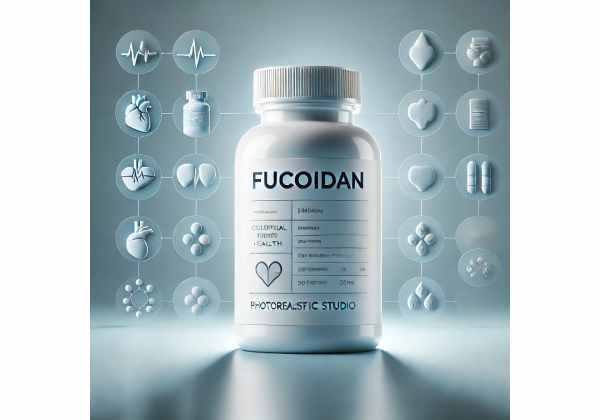
Fucoidan is a sulfated polysaccharide concentrated in brown seaweeds like Undaria pinnatifida (wakame) and Fucus vesiculosus. It has drawn attention for immune support, gut health, and gentle anti-inflammatory actions, alongside a heparin-like anticoagulant profile. Early human trials suggest fucoidan may enhance responses to influenza vaccination, ease joint discomfort in osteoarthritis, and help maintain a healthier gut microbiome during Helicobacter pylori treatment. Still, effects vary with species, extraction, and molecular weight, and not all benefits are proven in large trials. If you’re considering fucoidan, prioritize standardized extracts, check iodine content, and be mindful of interactions with blood thinners. This guide explains what fucoidan is, how it works, what the evidence shows, how to take it wisely, who should avoid it, and what to expect.
At-a-Glance
- May support vaccine antibody responses and help joint comfort in small randomized trials.
- Typical supplemental range: 300–1,000 mg/day of standardized extract.
- Avoid if you use anticoagulants or have a bleeding disorder; stop before surgery.
- People with thyroid disease, iodine sensitivity, or during pregnancy should use only with clinician guidance.
Table of Contents
- What is fucoidan and how does it work?
- What are the proven benefits so far?
- How to take fucoidan for best results
- How much fucoidan per day?
- Common mistakes and how to avoid them
- Is fucoidan safe and who should avoid it?
What is fucoidan and how does it work?
Fucoidan is a family of fucose-rich, sulfated polysaccharides present in the cell walls of brown macroalgae. Although “fucoidan” is often used as if it were a single compound, its structure varies by seaweed species (e.g., Undaria, Fucus, Laminaria, Cladosiphon), harvest season, and extraction method. Key variables that shape its behavior include molecular weight (from low-molecular-weight fragments to very large chains), degree and pattern of sulfation, branching, and the presence of other sugars (galactose, mannose, xylose). These structural details influence bioactivity—particularly anticoagulant effects, immune modulation, and binding to cell-surface molecules.
Mechanistically, fucoidan shows several complementary actions:
- Immune modulation. Orally consumed fucoidan appears to act primarily in the gut, where it can interact with intestinal immune cells and shift cytokine balance. Low-molecular-weight fractions may be partially absorbed, but most activity likely starts at the mucosal surface. In elderly adults, an extract from Undaria (mekabu) increased antibody titers following seasonal influenza vaccination—consistent with an “adjuvant-like” effect that boosts vaccine responsiveness rather than directly fighting pathogens.
- Adhesion and barrier effects. The sulfate groups allow fucoidan to bind selectins and other glycan-recognition proteins. This can reduce leukocyte adhesion (a step in inflammation) and may inhibit the attachment of some microbes to mucosal surfaces. In H. pylori models, fucoidan can hinder bacterial adhesion to gastric cells; in clinical settings, adding fucoidan to eradication protocols has supported gut microbial balance and symptom relief.
- Coagulation pathway interactions. Fucoidan’s negative charge and sulfate pattern let it interact with anticoagulant proteins in ways reminiscent of heparin. Depending on structure, fucoidan fractions can enhance inhibition of thrombin via antithrombin or heparin cofactor II and may also influence fibrinolysis. For consumers, the practical implication is simple: fucoidan can have mild blood-thinning effects and may potentiate prescribed anticoagulants.
- Antioxidant and anti-inflammatory signaling. Many fucoidan preparations dampen NF-κB activation in vitro and in animal models. Clinically, the best-supported outcomes so far involve symptom improvement (e.g., joint pain scores) rather than disease-modifying effects, and the heterogeneity of extracts remains a major reason results differ across studies.
Bioavailability and formulation. Native fucoidan has limited oral absorption; low-molecular-weight fucoidan (LMWF) and enzymatically processed oligosaccharides show higher bioavailability in experimental models. That said, “limited absorption” does not mean “ineffective”—a large share of fucoidan’s value may arise from local actions in the gut and crosstalk with the gut-immune axis. When choosing a product, check the standardized fucoidan content (often 75–95%), the source species, and whether the brand discloses molecular weight and contaminant testing (iodine and heavy metals).
Bottom line: fucoidan is not a single molecule but a toolbox of sulfated polysaccharides. Its most practical, near-term roles are immune support (as an adjunct) and gentle symptom relief in inflammatory states, with important safety nuances due to its anticoagulant potential.
What are the proven benefits so far?
The clinical landscape for fucoidan is promising but still early. Here’s what human research supports today, and where the gaps remain.
1) Vaccine response (immune support).
In a randomized, double-blind, placebo-controlled trial of older adults, 300 mg/day of Undaria (mekabu) fucoidan for four weeks before and 20 weeks after influenza vaccination enhanced antibody titers against certain strains compared with placebo. This suggests fucoidan can act like a nutritional adjuvant—helpful when immune responses are blunted by age. Importantly, this does not replace vaccination or medical care; it shows a supportive role.
2) Joint comfort in osteoarthritis.
A double-blind randomized trial using a Fucus vesiculosus extract (standardized to ~85% fucoidan) at 300 mg/day found symptom improvements on validated osteoarthritis scales versus placebo over 12 weeks. The study was modest in size, so results should be considered preliminary, but the design was rigorous and safety signals were acceptable. Fucoidan is not an NSAID; think of it as a gentle adjunct that may help some people feel and function better.
3) Gut comfort during H. pylori therapy.
Eradication regimens for H. pylori can disrupt the microbiome and cause GI side effects. An open-label randomized trial in patients with H. pylori reported that fucoidan (added before or around quadruple therapy) improved dysbiosis indices and GI symptoms versus standard therapy alone. Notably, eradication rates themselves did not consistently improve—so the benefit appears to be symptom and microbiome support, not a replacement for antibiotics.
4) What about cancer or metabolic health?
Most oncology data remain preclinical or from small adjunctive studies. Low-molecular-weight fucoidan has been explored as a supportive agent alongside chemotherapy in limited trials, with hints toward better tolerance and quality of life. While intriguing, these findings are not yet sufficient to recommend fucoidan as cancer therapy. For blood sugar, lipids, and body weight, human evidence is sparse and heterogeneous.
5) Antiviral and anti-adhesive actions.
Fucoidan can block viral attachment in vitro, and animal models show benefits in respiratory infections. Human evidence is currently limited to indirect outcomes (e.g., the influenza vaccine study above). As with many natural glycopolymers, in vitro potency does not guarantee clinical utility.
How strong is the evidence overall?
- Strongest signals: vaccine antibody titers in older adults; osteoarthritis symptom relief; improved GI tolerance and microbial balance during H. pylori treatment.
- Emerging/uncertain: oncology adjuncts, metabolic measures, direct antiviral outcomes.
- Key limitation: extracts differ widely by species, sulfation, and molecular weight, making cross-study comparisons tricky and quality control crucial.
Practical takeaway: If your goals center on immune support in older age, joint comfort, or gentler GI experiences during H. pylori protocols (with clinician oversight), fucoidan has human data worth considering—just keep expectations measured and product quality front-and-center.
How to take fucoidan for best results
Use fucoidan like a functional fiber with immune-modulating properties: consistently, in a standardized form, and with attention to timing around medications.
1) Choose a transparent product.
- Look for the source species (e.g., Undaria pinnatifida or Fucus vesiculosus).
- Prefer standardized extracts listing percent fucoidan (commonly 75–95%).
- If available, note molecular weight (LMWF or oligo-fucoidan is more absorbable; native higher-molecular-weight may act primarily in the gut).
- Confirm third-party testing for iodine and heavy metals—seaweeds can concentrate iodine, arsenic, and other elements; reputable brands disclose testing.
2) Match timing to your goal.
- Immune support around vaccination: begin 4 weeks before vaccination and continue at least several weeks after, mirroring the trial design that improved antibody titers.
- Joint comfort: daily intake with meals; allow 4–8 weeks for symptom trends.
- H. pylori protocols (with your clinician): discuss whether to use fucoidan before or around standard quadruple therapy to support microbial balance and GI comfort. Do not replace prescribed drugs.
3) Take with food and liquid.
Fucoidan is a soluble fiber-like polysaccharide; taking capsules or powder with a full glass of water and meals can improve tolerance and steady exposure. Split doses (morning/evening) if using ≥500 mg/day.
4) Stack sensibly.
- With probiotics: may be synergistic for gut comfort; start one at a time to monitor tolerance.
- With vitamin D or zinc: common immune-support stacks, but do not exceed safe upper limits.
- With anticoagulants or antiplatelets: avoid unless your prescriber explicitly approves due to additive bleeding risk.
5) Monitor how you respond.
Track a simple set of weekly checkpoints: energy, joint stiffness on waking, GI comfort, and any bruising or nosebleeds (a warning sign if you’re sensitive to anticoagulant effects). For thyroid-conscious users, note any palpitations or heat intolerance and consider periodic TSH checks if you use seaweed-derived products regularly.
6) Cycle or continue?
There’s no established need to cycle fucoidan. For goal-oriented use (e.g., around vaccination), a time-boxed plan makes sense. For joints or gut comfort, reassess at 8–12 weeks; if no clear benefit, discontinue.
Storage and forms.
Capsules are easiest for dose accuracy; powders can work in smoothies or soft foods. Store in a cool, dry place; keep powders sealed to prevent clumping.
A note on whole seaweed vs. extract.
Whole seaweed is nutritious but unpredictable for fucoidan content and iodine load. Extracts provide known fucoidan levels and, when well made, controlled iodine and heavy metal profiles. For targeted effects, extracts are typically preferable to culinary seaweed.
How much fucoidan per day?
Clinical studies have used a range of intakes, and the “right” amount depends on your goal, the extract’s standardization, and your medical context.
Evidence-informed ranges (adults):
- General supportive range: 300–1,000 mg/day of a standardized fucoidan extract (commonly 75–95% fucoidan), in 1–2 divided doses.
- Around vaccination (older adults): 300 mg/day reflected the dose used when antibody responses improved.
- Joint comfort (knee/hip osteoarthritis): 300 mg/day of a Fucus extract showed symptom reduction in a double-blind trial.
- Gut support in H. pylori care: research designs vary; many use hundreds of milligrams to low grams per day alongside medical therapy to support microbial balance and symptoms. Discuss specifics with your clinician.
Important caveats about dosing:
- Anticoagulant effect scales with dose and structure. If you bruise easily, experience nosebleeds, or take blood thinners, stay at the low end or avoid entirely unless medically supervised.
- Iodine exposure comes from the raw material, not fucoidan itself. Well-purified extracts can be low in iodine, but some products still carry meaningful amounts. If you have thyroid disease, aim for brands that publish iodine test results and favor moderate doses.
- Body weight and kidney function: Because fucoidan is largely unabsorbed and excreted, specific renal dosing rules are lacking; however, anyone with chronic kidney disease should seek clinician guidance due to mineral/iodine concerns from seaweed-derived products.
When to adjust:
- Down-titrate if you notice loose stools, bloating, or easy bruising.
- Pause 1–2 weeks before surgery/dental procedures to reduce bleeding risk.
- Reassess after 8–12 weeks; continue only if benefits are clear and safety markers (blood pressure, bruising, thyroid status where relevant) are stable.
Upper limits?
There’s no universally accepted “upper limit” for purified fucoidan extracts, and regulatory allowances vary by jurisdiction and product specification. In practice, staying within 300–1,000 mg/day covers the doses most frequently studied in controlled human trials for immune and joint outcomes while keeping safety margins sensible for everyday use.
Common mistakes and how to avoid them
1) Treating fucoidan as a single, interchangeable ingredient.
Reality: biological effects depend on species, sulfation pattern, and molecular weight. Fix: choose products that disclose source seaweed, percent fucoidan, and (ideally) molecular weight. Consistency matters.
2) Ignoring iodine and heavy metals.
Seaweeds can concentrate iodine and trace metals. While quality extracts can be low in these, not all are. Fix: pick brands with third-party lab results; if you have thyroid disease, favor products with published iodine content and keep intake moderate.
3) Combining with anticoagulants or high-dose fish oil without counsel.
Fucoidan can add to bleeding risk. Fix: if you take warfarin, DOACs, heparin, clopidogrel, aspirin, or high-dose omega-3s, get clinician clearance first—or avoid fucoidan.
4) Expecting drug-like results for unproven indications.
Fucoidan is not a replacement for antiviral medications, antibiotics, or disease-modifying therapies. Fix: use it adjunctively, targeting outcomes with actual human data (e.g., immune response to vaccination, joint comfort, GI tolerance in H. pylori protocols).
5) “More is better” dosing.
Higher doses may not yield better outcomes and can raise side-effect risks (GI upset, bruising). Fix: start within 300–1,000 mg/day, re-evaluate at 8–12 weeks, and avoid escalating without a reason.
6) Overlooking timing.
If your aim is to support vaccine responses, starting only after a shot misses the window used in trials. Fix: begin about four weeks pre-vaccination if your clinician agrees.
7) Buying non-standardized powders or culinary seaweed for therapeutic goals.
Whole seaweed is nutritious but unpredictable in fucoidan content and iodine load. Fix: use standardized extracts for targeted effects; enjoy whole seaweed as food in moderate amounts if you like it.
Checklist before you buy:
- Source species and percent fucoidan stated
- Third-party testing for iodine/heavy metals
- Molecular weight or process described (e.g., LMWF)
- Clear daily dose providing 300–1,000 mg fucoidan
- Sensible cautions on the label (anticoagulant interactions, pre-surgery hold)
Following these steps preserves the real-world advantages of fucoidan—gentle, multi-pathway support—while avoiding preventable pitfalls.
Is fucoidan safe and who should avoid it?
General safety profile.
Purified fucoidan extracts are typically well tolerated in clinical studies at intakes of a few hundred milligrams daily. The most common side effects are mild GI symptoms (gas, softer stools). However, two important safety topics deserve emphasis: blood-thinning potential and iodine/contaminant exposure.
Anticoagulant considerations.
Fucoidan’s heparin-like sulfation can enhance antithrombin or heparin cofactor II activity, translating to modest anticoagulant and potentially fibrinolytic actions. In everyday practice, this means a higher propensity for bruising or bleeding in sensitive individuals and a risk of additive effects with prescription anticoagulants or antiplatelet drugs. To minimize risk:
- Avoid fucoidan if you use warfarin, DOACs (e.g., apixaban, rivaroxaban), heparin/LMWH, clopidogrel, ticagrelor, or high-dose aspirin, unless cleared by your prescriber.
- Stop 1–2 weeks before surgery or dental procedures.
- Monitor for warning signs: unusual bruising, nosebleeds, black stools.
Iodine and heavy metals.
Although fucoidan itself doesn’t contain iodine, seaweed raw materials can, and extracts may carry residual iodine or trace metals. The European Food Safety Authority (EFSA) has highlighted seaweeds as significant contributors to iodine and, depending on species and processing, to arsenic (mostly organic forms), cadmium, lead, and mercury in some diets. Choose brands that publish contaminant testing and keep your daily intake within moderate supplemental ranges.
Who should avoid or seek medical guidance:
- People on anticoagulants/antiplatelets or with bleeding disorders.
- Pregnancy and breastfeeding: data are insufficient; avoid unless your clinician recommends a specific product and dose.
- Thyroid disease or iodine sensitivity: prefer low-iodine, third-party-tested extracts and consult your clinician, especially if you have autoimmune thyroiditis, nodular goiter, or take levothyroxine.
- Scheduled surgery or invasive dental work: pause in advance as noted.
- Seafood allergy: while fucoidan is a polysaccharide (not a protein), trace contaminants are possible; consider extra caution or allergy consultation.
Drug interactions to keep on the radar:
Besides anticoagulants/antiplatelets, theoretically additive effects could occur with other supplements that affect clotting (e.g., high-dose fish oil, ginkgo, garlic extract). Start one new product at a time and maintain a simple regimen so you can judge tolerance.
Testing and labels.
Prefer products with Certificates of Analysis (COAs) covering identity (fucoidan content), purity, iodine, and heavy metals, and avoid blends where the actual fucoidan amount per serving is unclear.
Bottom line: fucoidan is generally well tolerated but not for everyone. Respect its mild blood-thinning potential and the realities of seaweed sourcing, and involve your clinician if you have any medical conditions or take regular medications.
References
- Supplementation of elderly Japanese men and women with fucoidan from seaweed increases immune responses to seasonal influenza vaccination 2013 (RCT)
- Effects of fucoidan from Fucus vesiculosus in reducing symptoms of osteoarthritis: a randomized placebo-controlled trial 2016 (RCT)
- Effect of fucoidan on gut microbiota and its clinical efficacy in Helicobacter pylori eradication: A randomized controlled trial 2023 (RCT)
- Systematic Characteristics of Fucoidan: Intriguing Features for New Pharmacological Interventions 2024 (Systematic Review)
- Dietary exposure to heavy metals and iodine intake via consumption of seaweed and halophytes 2023 (EFSA Report)
Disclaimer
This guide is for educational purposes only and is not a substitute for personalized medical advice, diagnosis, or treatment. Fucoidan may interact with medications, especially blood thinners and antiplatelet agents, and may not be appropriate for everyone. Always consult a qualified health professional before starting, stopping, or changing any supplement, particularly if you are pregnant or breastfeeding, have a medical condition, or take prescription drugs.
If you found this helpful, consider sharing it with a friend on Facebook or X, and follow us for more evidence-based guides. Your support helps us keep creating high-quality, accessible health content.


